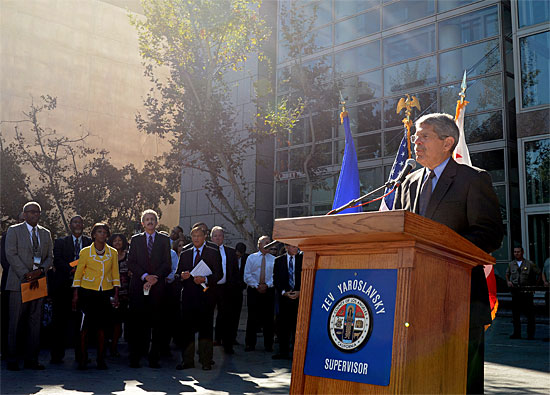Piloting a path away from jail
September 18, 2014

Supervisor Zev Yaroslavsky announces the creation of a new jail diversion program, with Dist. Atty. Jackie Lacey, in the yellow jacket, among those in attendance.
Confronting a jail system packed with rising numbers of mentally ill inmates, an unprecedented coalition of criminal justice and social services agencies have rallied behind an initiative that stresses rehabilitation over punishment for certain low-risk offenders and holds out the promise of reduced recidivism.
Eleven agencies—including the Superior Court and the offices of the district attorney, city attorney and public defender—are collaborating in the pilot project, orchestrated by Los Angeles County Supervisor Zev Yaroslavsky as a way to provide chronically homeless and severely mentally ill individuals with a carefully proscribed path out of jail and into recovery.
“I believe this is a more intelligent way of dealing with people like this, rather than putting them in jail, which is a far more expensive and less effective way to address mental health issues,” Yaroslavsky said during a Wednesday news conference at the Van Nuys courthouse.
“This program is going to start here, at the Van Nuys Courthouse and at the San Fernando Courthouse, but it could easily be placed in Compton, in Pomona, in Inglewood, Santa Monica, anywhere,” said Yaroslavsky, who allocated nearly half of the initiative’s $750,000 price tag from his district’s discretionary funding.
Among those who stood alongside the supervisor for Wednesday’s announcement was Los Angeles County Dist. Atty. Jackie Lacey. In recent months, she has become the leading proponent of alternative sentencing for low-risk mentally ill offenders, whom she says have little chance of success inside the county’s overcrowded lockup.
Lacey called the incarceration of such defendants, who suffer from bipolar disorder, schizophrenia, post-traumatic stress syndrome and other mental illnesses, an “unconscionable waste of human life and money.”
The new Third District Diversion and Alternative Sentencing Program will, under a series of specific conditions, provide 50 eligible participants with a variety of wraparound services—including permanent supportive housing and mental health treatment—intended to keep them off the streets, out of jails and emergency rooms, and put them on a path to self-sufficiency. Those services will be arranged by the non-profit San Fernando Valley Community Mental Health Center.
Under the program’s protocols, prosecutors and public defenders will collaborate with psychologists to identify severely mentally ill—but nonviolent—chronically homeless individuals eligible for the program’s shelter, counseling, medication management and other services, including employment and vocational assistance. A judge must approve the defendant’s participation.
Eligible misdemeanants will undergo treatment for 90 days and pay restitution, if necessary. Charges will be dismissed after the successful completion of the program. Otherwise, the criminal case will proceed.
Eligible felons, meanwhile, will be required to plead guilty or no contest to the charges against them and undergo treatment for 18 months, with case managers and probation officers regularly checking their progress. They also will have to pay restitution.
“What I like about this program is it does have a lot of leverage with participants,” said Adrian Sheff, director of adult and older adult programs at the San Fernando Valley Community Mental Health Center. “They’re not just being diverted from jail and told to bring a note back from their treatment provider to say they completed the program. Instead, there are ongoing reports, feedback with the court and probation and other measures to ensure they won’t wind up back in jail or commit new offenses.”
City Atty. Mike Feuer, whose office prosecutes misdemeanors, agreed during Wednesday’s event that jail is the wrong place to deal with severe mental illness. He said the pilot program’s more “innovative and humane” approach will keep neighborhoods safer.
Said Superior Court Presiding Judge David Wesley: “It is sometimes in the best interests of the public, and of mentally ill offenders, to divert someone from the criminal justice system.”
Los Angeles County Mental Health Director Marvin Southward said he hopes the pilot program marks the beginning of lasting reforms in the way the criminal justice system treats the severely mentally ill and chronically homeless.
“I think we have to show that by investing in an intensive program like this, we could produce good enough outcomes and save enough money that it’s worth spreading this model to other places.”
Posted 9/18/14












 405 bridge work causes a stink
405 bridge work causes a stink
